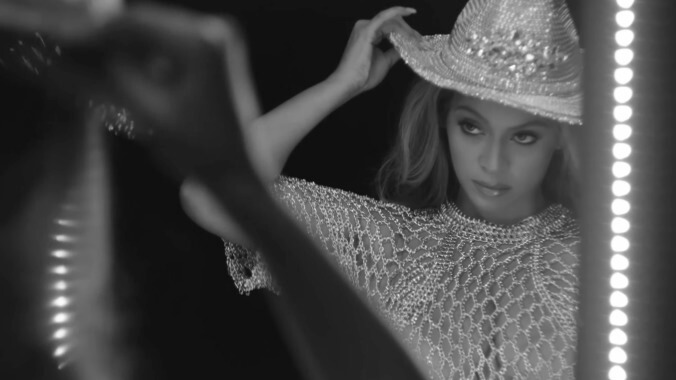Beyoncé fans launch campaign to get new singles on country radio
Beyoncé fans want country radio to acknowledge her, but Beyoncé doesn't need their recognition

The most awarded artist in Grammy history and a cultural icon that transcends the typical formula for a pop star, Beyoncé continues to innovate and experiment with her music. At this point, the only person she’s competing with is herself. She has no need for the traditional paths to success, the trophies, the chart positions, the streams. (“If I gave two fucks, two fucks about streaming numbers/Would have put Lemonade up on Spotify,” she declared on Everything Is Love.) Nevertheless, while Beyoncé is busy creating her own lane, her fans continue to push for her to get the recognition they believe she deserves, which is why the Beyhive is pushing to get her new tracks “Texas Hold ’Em” and “16 Carriages” played on country radio.
Fan pages like “Beyoncé Legion” and “beyoncépress” are organizing their followers to request the new tracks directly at country radio stations across America. They make it easy for fellow fans to do so by collecting links to country stations’ websites and amassing phone numbers to call all in one place.
Beyoncé fans have always been motivated to champion their idol, but the push behind putting her on country radio is particularly personal. The artist’s previous foray into the genre, “Daddy Lessons” from Lemonade, was met with some hostility from the country music establishment. A performance of the song at the Country Music Awards with the Chicks faced racist backlash, and the song was reportedly rejected by the Grammys’ country music committee. In the short time since she released these new country tracks, “Texas Hold ’Em” only received two spins on country radio (per the US Radio Updater account). So it’s no wonder Beyoncé’s fiercely protective fans want to take matters into their own hands.
Given the country music renaissance of the last year, it’s no wonder that Beyoncé would explore the genre as part of her own Renaissance, either. But that doesn’t mean the superstar has any desire to engage with the country music establishment. According to US Radio Updater, the songs weren’t even serviced to country radio (meaning Beyoncé’s own team isn’t doing a promotional push in the format). Fans have elsewhere speculated that Renaissance is a reclamation of music pioneered by Black artists (Act I was House, Act II is country), a theory supported by her work with roots musician Robert Randolph and banjo player Rhiannon Giddens on the new tracks. (Giddens, in particular, has worked to educate the public on how the banjo was an instrument popularized by Black musicians before it became part of country music’s more white mainstream image.) Having her own country songs rejected or neglected by the country establishment only serves as a meta-narrative on top of the reclamation of Renaissance—it emphasizes exactly why the project is necessary in the first place.
Beyoncé is a canny businesswoman and a savvy political operator; she knew well how her country pivot would be received, and apparently sat on this album for “years” (according to her mother Tina Knowles) waiting for the right moment to drop it. Accolades—like becoming the first Black female artist to top the Apple Music U.S. Country charts, per Salon—are a cherry on top of her success, but for Beyoncé, they’re not the point of a project. Fans may campaign to get her due on country radio, but Beyoncé understands she doesn’t need that airplay to secure Act II’s place in history. Their rejection will work just as well for that.